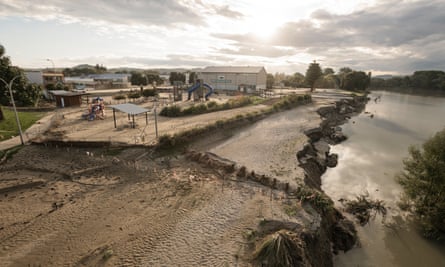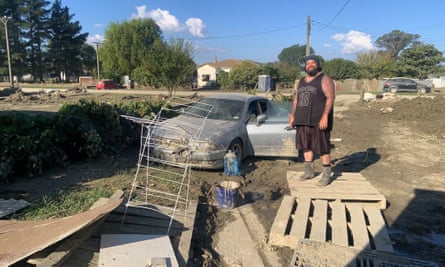My Cyclone Diary: The true meaning of home and community emerges in cleanup | Cyclone Gabriel
〇Prime Minister Chris Hipkins visited the flood-affected areas of Hawke’s Bay, including our town of Wailoa, in a third attempt, previously hampered by weather. He did not provide specific guarantees regarding long-term financial support, but credited the iwi (tribes) and marae (meeting houses) for the important work done over the past month. He acknowledged the possibility of an event as follows. Cyclone Gabriel It happened again, and the cumulative effect of the damage inflicted reminded me of “New Zealand volatility”, adding that more could be done. You can’t make a plan and assume that it will work.”
This observation is instinctively felt by people like the local teacher José, who was riding out on horseback across the brown sea with his students to save the flood the morning after the flood. Maori language learning center. This knowledge is why he and others like him are skeptical and fearful of formal visits by people in suits. There is a feeling that the work should precede the words.
in conclusion this seriesand to look to such people.
Justin rests against the wall of a flooded house on a dirt road in the scorching sun. Dusk is approaching, but he and his group of friends are having a beer after a day’s labor to clear the silt and search for their rescued belongings. His house is across the road. It is his great-grandmother’s house which he inherited. Justin traces his whakapapa (family tree) back decades from his ancestor, Te Kooti Arikirangi Te Turki. Teturki was a 19th-century polymath, founder of the Lingatoo religion and a guerrilla fighter. When floodwaters flooded his home, he hid his written Whakapapa in a crevice in the attic.

Make your way through thick swirls of dust to his front yard, a burnt mud expanse strewn with debris. He moves towards the Wairoa River behind the house. Situated near a bend where the river broke, the water went through rapids and rose at an astonishing rate. His neighbor, who lives by the field, went to work at the freezing factory early that morning and lost everything. The house was just inches off the ground, leaving no space for water to run underneath. I weighed my inventory with and figured I could trade Yute more easily. Leaving his car submerged in water, he turned his attention to stacking his belongings on tables and shelves. He rolls the dice against his own safety while intermittently pumping buckets of water through his PC, sneakers, electronics and windows. “I can’t afford to replace all of this. ‘It took me too long to collect it all and I couldn’t lose it’.”

From his window he counted each household along the street taking refuge in the early morning light. Tired of his efforts to stack in rising waters, he grabbed a bag, two canned foods, a hammock, a poncho, an ax and a fire starter. His dog swam forward while fighting the current before being rescued by an ambulance. On board, he recalls the wheelchair-accessible home and realizes the occupant’s car is still there. They rescued a 92-year-old man with a caregiver who was unable to carry him through the flood waters. and we carried him to the marae.”
For several hours, Justin and a few neighbors sat on a cowshed hill on the outskirts of town, watching the river flood their homes.
The intervening weeks were spent clearing the silt. He waits for his bed and sleeps in a hammock stretched over the muddy ground. He repaired his 10 washing machines, 5 refrigerators, chest of drawers, and televisions for residents on the street, and collected and dried dishes. It took a while to process the event. We were neighbors all along and didn’t know anything. This united us. We started yak.

Calm and contemplative, Justin grew up in the Wairoa suburb of Nuhaka before moving to Australia with his mother in 2000 and returning to Wairoa in 2018.
His Nan died in 1989. It was the year after Cyclone Bora flooded the area. The river broke at the same bend. After the event and just before her death, she built a house in Block. In a corner of the garden was a pohutukawa tree that he had planted for his son, telling him that the land would one day be his and instructing him to choose a spot. Somehow, he added, the trees were unaffected by the flood.
Inside, as I was rummaging through my pile of belongings, he handed me a paper card. He explains that he received a package of food. Tearing up, he showed me the cover. The inside of the card features a drawing by his 4-year-old named Kyrah wishing the recipient well and safe. “I plan to keep it in the fridge for the rest of my life,” he says.
https://www.theguardian.com/world/2023/mar/26/my-cyclone-diary-amid-the-cleanup-the-true-meaning-of-home-and-community-emerges My Cyclone Diary: The true meaning of home and community emerges in cleanup | Cyclone Gabriel
